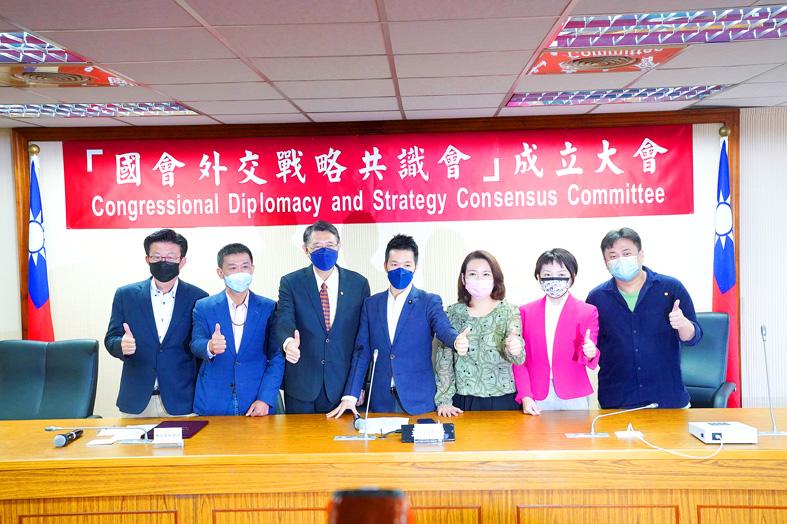The Legislative Yuan yesterday inaugurated a new committee on foreign affairs, with the goal of improving the nation’s international standing by achieving unity among legislators from different parties.
According to its charter, the Congressional Diplomacy and Strategy Consensus Committee aims to maintain regional peace through defense collaboration, as well as promote the nation’s international participation.
Legislative Yuan Secretary-General Lin Jih-jia (林志嘉) praised the committee as an “additional counterparty between Taiwan and other countries.”

Photo: CNA
The committee, the first of its kind, would be able to overcome obstacles that Taiwan faces in its foreign interactions, said Lin, who attended on behalf of Legislative Speaker You Si-kun (游錫堃).
Through this “innovation,” lawmakers could reach a consensus over issues of national concern, enabling them to communicate internationally with one voice, he said.
They could then liaise with a wider array of organizations than possible by a congressional friendship association, such as Harvard University, the Heritage Foundation, international think tanks and non-governmental organizations (NGOs), he added.
Taiwan cannot remain on the sidelines as authoritarian expansionism threatens global stability and democracies everywhere, Lin said, touting the establishment of the committee as an expression of the legislature’s willingness to act.
Democratic Progressive Party Legislator Mark Ho (何志偉), who is to serve as chairman of the committee, emphasized the nonpartisan nature of the group.
Faced with changeable global circumstances, legislators need a pragmatic platform to discuss foreign affairs, Ho said.
Hopefully, it could result in a unified voice that sustains, regardless of which party is in power, he added.
In its day-to-day operations, the committee is to organize seminars and publish related commentaries, in addition to cooperating with international think tanks and NGOs, Ho said.

Taipei, New Taipei City, Keelung and Taoyuan would issue a decision at 8pm on whether to cancel work and school tomorrow due to forecasted heavy rain, Keelung Mayor Hsieh Kuo-liang (謝國樑) said today. Hsieh told reporters that absent some pressing reason, the four northern cities would announce the decision jointly at 8pm. Keelung is expected to receive between 300mm and 490mm of rain in the period from 2pm today through 2pm tomorrow, Central Weather Administration data showed. Keelung City Government regulations stipulate that school and work can be canceled if rain totals in mountainous or low-elevation areas are forecast to exceed 350mm in

EVA Airways president Sun Chia-ming (孫嘉明) and other senior executives yesterday bowed in apology over the death of a flight attendant, saying the company has begun improving its health-reporting, review and work coordination mechanisms. “We promise to handle this matter with the utmost responsibility to ensure safer and healthier working conditions for all EVA Air employees,” Sun said. The flight attendant, a woman surnamed Sun (孫), died on Friday last week of undisclosed causes shortly after returning from a work assignment in Milan, Italy, the airline said. Chinese-language media reported that the woman fell ill working on a Taipei-to-Milan flight on Sept. 22

COUNTERMEASURE: Taiwan was to implement controls for 47 tech products bound for South Africa after the latter downgraded and renamed Taipei’s ‘de facto’ offices The Ministry of Foreign Affairs is still reviewing a new agreement proposed by the South African government last month to regulate the status of reciprocal representative offices, Minister of Foreign Affairs Lin Chia-lung (林佳龍) said yesterday. Asked about the latest developments in a year-long controversy over Taiwan’s de facto representative office in South Africa, Lin during a legislative session said that the ministry was consulting with legal experts on the proposed new agreement. While the new proposal offers Taiwan greater flexibility, the ministry does not find it acceptable, Lin said without elaborating. The ministry is still open to resuming retaliatory measures against South

1.4nm WAFERS: While TSMC is gearing up to expand its overseas production, it would also continue to invest in Taiwan, company chairman and CEO C.C. Wei said Taiwan Semiconductor Manufacturing Co (TSMC) has applied for permission to construct a new plant in the Central Taiwan Science Park (中部科學園區), which it would use for the production of new high-speed wafers, the National Science and Technology Council said yesterday. The council, which supervises three major science parks in Taiwan, confirmed that the Central Taiwan Science Park Bureau had received an application on Friday from TSMC, the world’s largest contract chipmaker, to commence work on the new A14 fab. A14 technology, a 1.4 nanometer (nm) process, is designed to drive artificial intelligence transformation by enabling faster computing and greater power